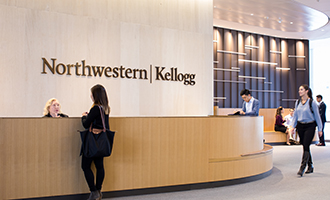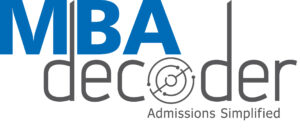
The Kellogg MBA interview process is unique because the b-school tries to interview a majority of its applicants. That’s why applicants can start getting interview invitations within the next day of applying. The interviews continue to pour-in, right until the decision date, which means, it can be a long-long wait for some applicants before they hear back with an interview update.
Duration: about 30-45 minutes
Format: By Invitation only
Who conducts them? Kellogg MBA interviews are conducted by mainly alumni with some involvement from adcom and second year students.
Location: All interviews are conducted virtually
Interviewer’s access: Interviewer would access to only your resume
How to schedule the interview: After you receive an interview invitation email from Kellogg, you will log into the application portal and ‘submit a request’ for an interview by selecting a time zone. You will then be matched with your interviewer and will set up a date and time with them. You have a time window in which you will have to complete the interview
The adcom allows applicants to reschedule interviews ONLY in cases of emergency. So be sure, to pick a date on which you can definitely attend, otherwise you can miss your chance.
Interview Waiver: Kellogg tries to interview about 80% of its applicants. However, sometimes applicants are given interview waivers because of high application volume and limited availability of interviewers. If you receive a waiver, the admissions committee may contact you later for further information before making a decision on your candidacy.
The admissions committee also gives interview waivers if you are unable to attend an interview that you have already scheduled. They do not allow rescheduling of interviews so do not to default on this opportunity.
Kellogg MBA Interview Process: Kellogg interviews are behavioural. Prepare the usual questions like walk me through your resume, goals, why Kellogg, how will you contribute and situational examples. The b-school highly values teamwork, collaboration and people skills, so incorporate these elements in your answer (without force fitting them),
Because Kellogg has a very close-knit culture, they care whether you understand how the program is suitable for you or how will you contribute to the community. So, you may have researched the program while writing your essays, but continue to speak with students and alumni even after you have submitted your application to understand the finer aspects of the MBA program, which will give you a more informed perspective during your interview.
Sample Interview Questions:
Introduction and Career related:
Walk me through your résumé
What are your short-term and long-term goals?
What are your alternate goals?/ What is your plan B for the short term?
Why MBA? What do you hope to get out of Kellogg MBA?
What do you like and don’t like about your current job?
Elaborate on your responsibilities for your full-time jobs
What drew you to your current role?
What does your day-to-day work look like?
What is the most difficult part of your job?
B-school related:
Why Kellogg?
How will you contribute to Kellogg? How will you get involved in Kellogg’s community?
Which extra-curricular activities will you engage in while in school?
What traits make you a good contribution to the future class?
Which other b-schools have you applied to?
SITUATION RELATED:
Leadership:
Tell me about your leadership style.
Talk about a time you took on a leadership role?
What is your most significant leadership experience? Why?
What role do you tend to play in your organization?
Tell me about a time you had to jump in and solve a problem using your leadership skills.
Achievements:
Describe a professional success
Tell me about your proudest accomplishment at work.
Tell me about a time you went above and beyond your mandate?
TEAM:
How do you manage teams if you are leading them?
Describe your best team experience.
In which of your recent projects have you shown the best teamwork?
What role do you tend to play in teams when you’re not the leader?
What do you do to work well with your teammates?
Describe a time you had to manage a difficult teammate and how would you handle it differently the next time.
Tell me about a time when a teammate wasn’t doing his job. What did you do?
Tell me about a time when you had to convince others to follow your approach.
Tell me about a time you went out of your way to help someone?
Tell me about a time you worked with people from diverse backgrounds or teams.
Challenges:
Describe a time you overcame a challenge at work
Tell me about a professional failure.
Tell me about a time your team failed to achieve goals, how did you handle it and what did you learn?
Tell me about a time you received criticism and how you reacted to it.
Tell me about a moment where you had adversity with a coworker or subordinate?
Tell me about a moment where you had adversity with a boss?
Tell me about a time you dealt with conflict?
Tell me about a time you had to change your behavior when things didn’t go as expected.
Tell me about a time you worked in an ambiguous situation.
Tell me about a time you got knocked down and had to pick yourself back up.
Self Awareness Questions:
What motivates you?
What would your coworkers or boss give you as feedback for strengths and weaknesses?
Three words your colleagues would describe you as?
What would your friends say are your biggest strengths?
Who is a leader you admire? Why?
What are you most curious about?
Other Questions:
Describe your hobbies
Tell me about an activity/cause that you are passionate about
Tell me about an extracurricular with particular meaning for you.
What questions do you have for us?
Is there anything you wished I had asked you?
Is there anything you hadn’t shared yet in today’s conversation that you’d like to cover?
